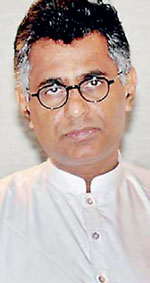21 Sep 2017 - {{hitsCtrl.values.hits}}
By Shabiya Ali Ahlam
The government yesterday stressed upon the need for the public to have a more open mindset with regard to the nation’s physical infrastructure development agenda, so that the plans formulated can be executed in an effective and timely manner.
As many proposals and measures to be imposed by the government being met recently with protests and negativity, megapolis minister yesterday emphasized the need for greater support to move forward with the ministry’s endeavours.

“Some negative attitudes of the public cumulated by the resistance to change, long payback periods due to lower rates of return, different priorities of the government such as allocation of limited resources to education, food and heath security, etc. are a few obstacles for the proposed plans,” said Megapolis and Western Development Minister Champika Ranawaka listing the key challenges faced by his ministry in implementing the plans.
The minister made the comments at a forum titled ‘Financing for Sustainable Urbanization in Asia and the Pacific’ hosted jointly by the Asian Development Bank (ADB) and Institute of Policy Studies (IPS) in Colombo, yesterday.
With the proposed projects for megapolis being highly capital incentive, Ranawaka pointed out that in addition to the negative sentiments expressed by the public, financing such projects has also become a challenge. The finance required for the development programme is estimated to be about
US $ 40 billion.
In a bid to pick up pace, the minister stressed it is imperative for the government to integrate the private sector to ensure sustainable financing of the proposed project through mechanisms such as public-private partnerships (PPPs).
“The model would be applicable to the projects that the government does not invest in, such as infrastructure development that is needed to create the conducive environment for the growth,” professed Ranawaka.
He added that to achieve the desired objectives, there is a dire need to balance the public opinion and PPPs in a more meaningful manner.
The key factors considered in financing urban projects are physical congestion and income disparity, namely among the city dwellers, Ranawaka said.
The development project will initially focus on the Colombo, Kalutara and Gampaha Districts. The expectations of the agenda, according to the minister, are to ensure “spatial transformations of the urban masses and the structural transformation of the national economy”.
It was pointed out that Sri Lanka’s urbanization holds some “unique” characteristics mainly because it is an island and approximately 6 percent of the total landmass of the county hosts 25 percent of the population.
06 Nov 2024 45 minute ago
05 Nov 2024 05 Nov 2024
05 Nov 2024 05 Nov 2024
05 Nov 2024 05 Nov 2024
05 Nov 2024 05 Nov 2024